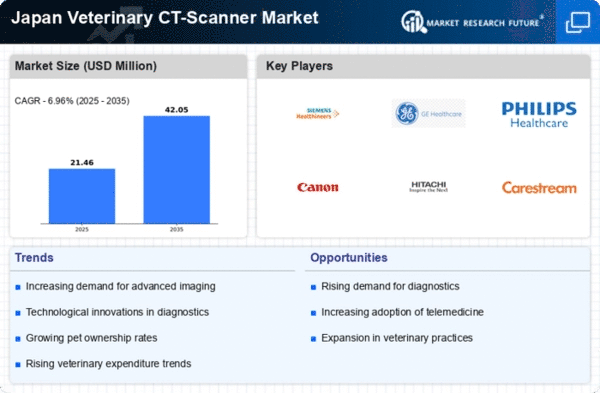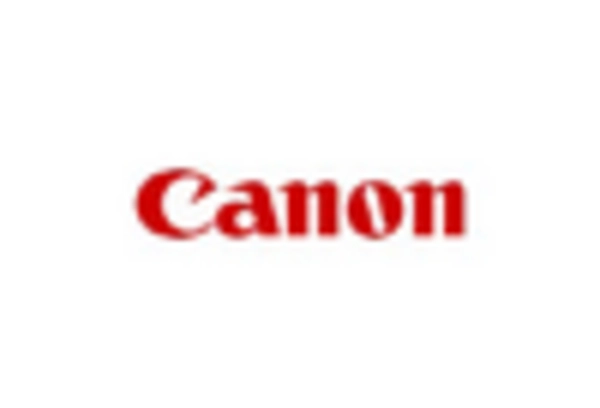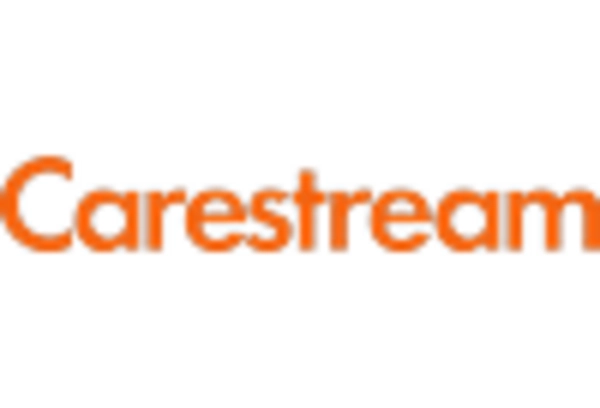Focus on Preventive Healthcare
The focus on preventive healthcare in veterinary medicine is emerging as a key driver for the market in Japan. Pet owners are increasingly recognizing the value of preventive measures, leading to a rise in routine check-ups and diagnostic imaging. This shift towards preventive care is likely to enhance the demand for ct-scanners, as veterinarians utilize these tools to identify potential health issues before they escalate. The veterinary ct-scanner market is expected to benefit from this trend, as practices invest in technology that supports early detection and intervention. Additionally, educational campaigns aimed at promoting preventive healthcare are likely to further increase awareness among pet owners, thereby driving demand for advanced imaging solutions. This proactive approach to animal health signifies a transformative change in veterinary practices, with ct-scanners playing a pivotal role.
Expansion of Veterinary Practices
The expansion of veterinary practices across Japan is a critical driver for the veterinary ct-scanner market. As more veterinary clinics and hospitals open, the demand for advanced imaging technologies rises correspondingly. This expansion is not only due to an increase in pet ownership but also reflects a broader trend towards specialized veterinary services. Many new practices are incorporating ct-scanners to provide comprehensive diagnostic services, which enhances their competitive edge. The veterinary ct-scanner market is likely to benefit from this trend, as clinics seek to offer high-quality care. Additionally, the Japanese government has been supportive of initiatives aimed at improving animal health services, which may further stimulate the growth of veterinary practices and, consequently, the demand for ct-scanners. This dynamic environment suggests a robust future for the veterinary ct-scanner market.
Increased Investment in Animal Healthcare
Increased investment in animal healthcare is a significant driver for the veterinary ct-scanner market in Japan. As pet owners become more willing to spend on their pets' health, veterinary clinics are responding by upgrading their facilities and equipment. This trend is evident in the rising expenditure on veterinary services, which has seen an annual growth rate of around 5% in recent years. Consequently, veterinary practices are more inclined to invest in advanced diagnostic tools, including ct-scanners, to meet the evolving expectations of pet owners. Furthermore, the growing trend of pet insurance is likely to contribute to this investment, as insured pet owners are more likely to seek advanced diagnostic services. This influx of capital into animal healthcare is expected to bolster the veterinary ct-scanner market, creating opportunities for manufacturers and suppliers.
Rising Demand for Advanced Diagnostic Tools
The veterinary ct-scanner market in Japan is experiencing a notable increase in demand for advanced diagnostic tools. This trend is largely driven by the growing awareness among pet owners regarding the importance of early disease detection and accurate diagnosis. As veterinary practices adopt more sophisticated technologies, the need for high-quality imaging solutions becomes paramount. The market is projected to grow at a CAGR of approximately 8% over the next few years, reflecting the increasing reliance on ct-scanners for precise diagnostics. Furthermore, the integration of artificial intelligence in imaging analysis is expected to enhance diagnostic accuracy, thereby further propelling the veterinary ct-scanner market. This shift towards advanced diagnostic tools indicates a significant transformation in veterinary practices, emphasizing the necessity for veterinarians to invest in state-of-the-art equipment.
Technological Integration in Veterinary Medicine
Technological integration in veterinary medicine is significantly influencing the veterinary ct-scanner market in Japan. The adoption of digital imaging technologies and telemedicine is reshaping how veterinary services are delivered. With the rise of remote consultations, veterinarians are increasingly relying on ct-scanners to provide accurate diagnostics that can be shared with specialists across the country. This trend is expected to enhance the efficiency of veterinary practices and improve patient outcomes. Moreover, the veterinary ct-scanner market is likely to see innovations such as 3D imaging and enhanced software capabilities, which could further streamline diagnostic processes. As veterinary professionals embrace these technological advancements, the market is poised for growth, reflecting a shift towards more integrated and efficient veterinary care.
















